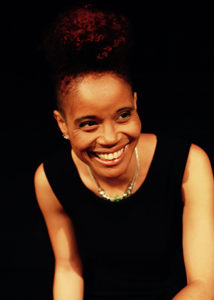Celebrating Pride: A Profile of Poet and Activist Staceyann Chin
In honor of Pride Month, we’re featuring profiles of prominent LGBTQ humanists or atheists. This week we feature Staceyann Chin. An earlier version of this profile appeared in the November/December 2017 issue of The Humanist.
“Every day I get better at knowing that it is not a choice to be an activist; rather, it is the only way to hold on to the better parts of my human self. It is the only way I can live and laugh without guilt.”
—Staceyann Chin, The Other Side of Paradise
 Staceyann Chin was born on December 25, 1972, in Jamaica. Shortly thereafter her mother abandoned her and fled to Montreal, Quebec, and her assumed father, a wealthy Chinese man from Montego Bay, refused to acknowledge her. For the next six years of her life, Chin was raised by her grandmother, then she and her brother lived with an aunt and uncle in a more affluent area called Bethel Town. Here Chin was cruelly teased for her mixed ethnicity and began lying to classmates that her mother wanted Staceyann to join her in Canada.
Staceyann Chin was born on December 25, 1972, in Jamaica. Shortly thereafter her mother abandoned her and fled to Montreal, Quebec, and her assumed father, a wealthy Chinese man from Montego Bay, refused to acknowledge her. For the next six years of her life, Chin was raised by her grandmother, then she and her brother lived with an aunt and uncle in a more affluent area called Bethel Town. Here Chin was cruelly teased for her mixed ethnicity and began lying to classmates that her mother wanted Staceyann to join her in Canada.
She later moved in with a great aunt in a very poor area of Montego Bay (ironically called Paradise) and decided to ask her father to pay her way to the prestigious Mount Alvernia High School for Girls. He agreed so long as she didn’t try to prove paternity. Meanwhile, Chin’s attempts to reach out to her mother proved futile. Tired of lying about her family and her living conditions, Chin graduated from high school vowing to start the next phase of her life with total honesty. When she started college in Kingston, Chin recounted in a 2008 New York Times Magazine piece called “Paradise of Lies,” she stayed true to her vow:
…to the point of overcompensation. On the first day of classes there I told the stranger sitting next to me that my mother abandoned me, and that I was in college only because of my rich, maybe-father’s loan. The first time I had sex I announced as much to my biology class. I told my physics class about my first orgasm. And when it dawned on me that I was attracted to girls, it was a matter of course that I said so to my African philosophy class at University of the West Indies.
Coming out as a lesbian in Jamaica in the 1990s proved dangerous, as doing so carried the threat of rape for any woman. After Chin was sexually assaulted by a group of male students in a dorm bathroom, she decided to leave the violent homophobia of Jamaica behind. In 1997 she moved to New York where, she writes, “you couldn’t throw a rock in the Village without hitting a lesbian recounting her life story.”
Chin began writing and publishing poetry and took home winning prizes in numerous poetry slams. In October 2019 she published Crossfire: A Litany for Survival, a full-length collection of poetry from five previously published chapbooks. Widely known as a co-writer and original performer in the Tony Award-winning Russell Simmons Def Poetry Jam on Broadway, Chin has also performed at the Nuyorican Poets’ Café and in several critically acclaimed solo theater pieces. The most recent was MotherStruck (directed by Cynthia Nixon and produced by Rosie O’Donnell), which chronicled her experiences as a single mother (her daughter was conceived through in-vitro fertilization and born in 2012).
A vocal LGBTQ rights activist, Chin has written for numerous outlets and appeared on 60 Minutes and Oprah, where she talked about homophobia in Jamaica. She has received awards from the Human Rights Campaign, Immigration Equality, the Lesbian AIDS Project, the New York State Senate, and Planned Parenthood. Chin was honored with the American Humanist Association’s 2017 LGBTQ Humanist Award.
In a 2013 interview with Huffington Post Chin described the impetus for writing her critically acclaimed 2010 memoir, The Other Side of Paradise,
so that those coming up behind me would at least have a placeholder. I don’t imagine that it is the story of every lesbian that came out of Jamaica or every lesbian that came out of a brown space, or every girl that was left by her mother, but it became another placeholder.
In the same interview she spoke of the importance for the LGBTQ community to address multiple issues, noting that “Anywhere you have a large gathering of poor people, you have people who are deeply trenched in religion” and that those spaces tend to be more violent and homophobic. “There has to be more comprehensive conversation around poverty, race, homophobia and religion,” Chin stated.
